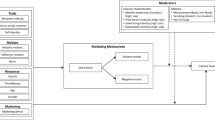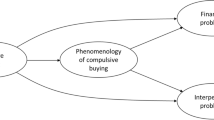Abstract
The paper highlights key research findings regarding compulsive buying behavior and aims at describing the relationship between compulsive buying and an alternative buying phenomenon, i.e. impulse buying. These nonstandard buying behaviors are frequently found alongside each other in consumer research literature. Two common views of the relationship between compulsive buying and impulse buying are discussed and combined to form a hybrid conceptualization. Impulse buying is conceived to be associated with positive affective states, while compulsive buying is primarily driven by negative affect and characterized by an increasing loss of consumer self-control. A proposed model of compulsive buying antecedents is offered based on escape theory and some key findings in research. Higher levels of consumer depression, greater materialistic values, lower self-esteem, greater abilities to fantasize and tendencies to impulse buy, and higher levels of anxiety and obsessive-compulsiveness are all suggested to have direct, positive correlations with compulsive buying behavior.
You have full access to this open access chapter, Download conference paper PDF
Similar content being viewed by others
Keywords
These keywords were added by machine and not by the authors. This process is experimental and the keywords may be updated as the learning algorithm improves.
The paper highlights key research findings regarding compulsive buying behavior and aims at describing the relationship between compulsive buying and an alternative buying phenomenon, i.e. impulse buying. These nonstandard buying behaviors are frequently found alongside each other in consumer research literature. Two common views of the relationship between compulsive buying and impulse buying are discussed and combined to form a hybrid conceptualization. Impulse buying is conceived to be associated with positive affective states, while compulsive buying is primarily driven by negative affect and characterized by an increasing loss of consumer self-control. A proposed model of compulsive buying antecedents is offered based on escape theory and some key findings in research. Higher levels of consumer depression, greater materialistic values, lower self-esteem, greater abilities to fantasize and tendencies to impulse buy, and higher levels of anxiety and obsessive-compulsiveness are all suggested to have direct, positive correlations with compulsive buying behavior.
Author information
Authors and Affiliations
Corresponding author
Editor information
Editors and Affiliations
Rights and permissions
Copyright information
© 2016 Academy of Marketing Science
About this paper
Cite this paper
Darrat, A.A. (2016). Compulsive Buying Behavior: Relationship with Impulse Buying and a Proposed Model of Antecedents. In: Obal, M., Krey, N., Bushardt, C. (eds) Let’s Get Engaged! Crossing the Threshold of Marketing’s Engagement Era. Developments in Marketing Science: Proceedings of the Academy of Marketing Science. Springer, Cham. https://doi.org/10.1007/978-3-319-11815-4_139
Download citation
DOI: https://doi.org/10.1007/978-3-319-11815-4_139
Publisher Name: Springer, Cham
Print ISBN: 978-3-319-11814-7
Online ISBN: 978-3-319-11815-4
eBook Packages: Business and ManagementBusiness and Management (R0)




